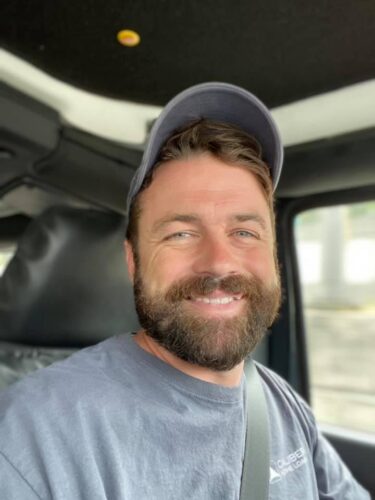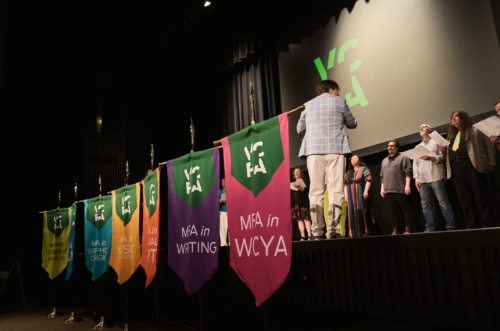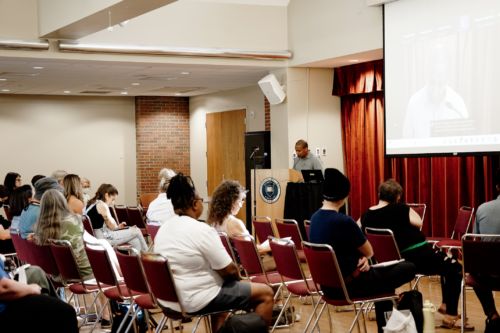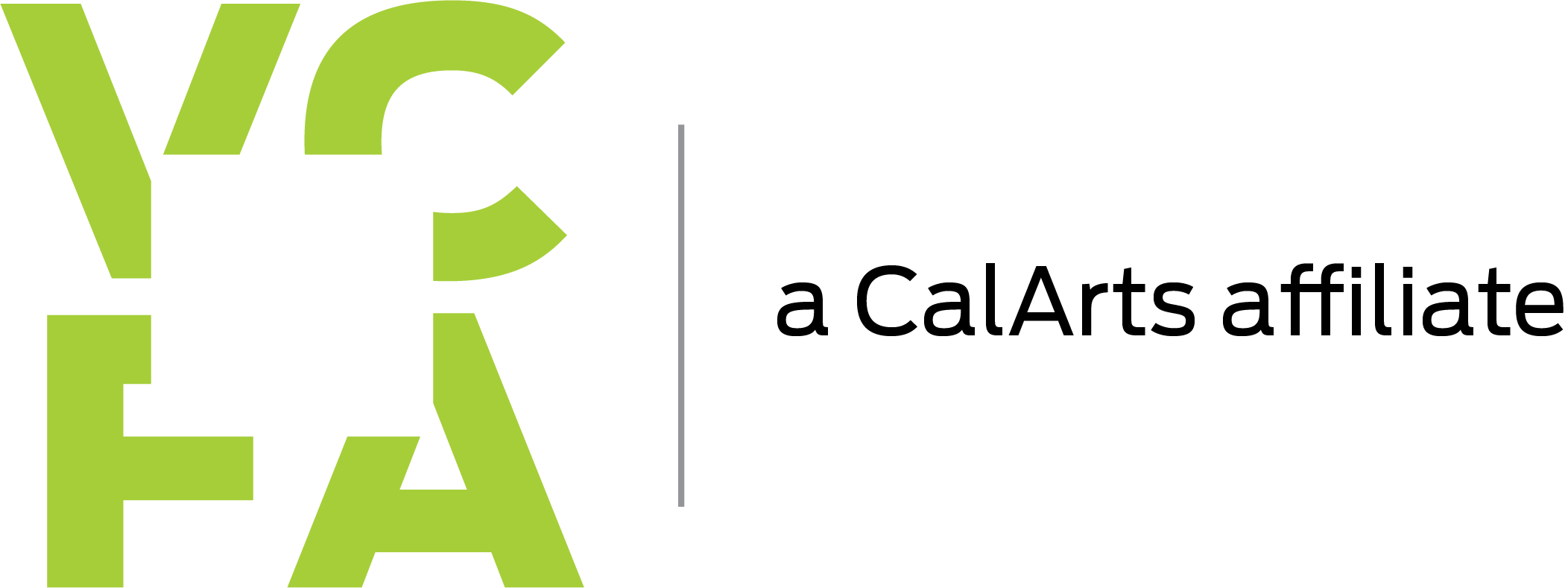STUDENT STORY: Aaron Courts, 2026 MFA in Writing
MFA in Writing student Aaron Courts started his VCFA journey at his first residency in the summer of 2024. As a new student, Courts reflected on what it’s really like to attend a VCFA residency on his Substack, The Sword & Pen.
Courts reflected on what it’s really like to attend a VCFA residency on his Substack, The Sword & Pen.
As Courts writes in his Substack story “Gleaned from nomads,” “When you’re at a VCFA residency, it feels like there’s a secret—a secret to creative fulfillment—and they’re screaming it from the mountain top.”
Now that his first semester in the MFA in Writing program has officially kicked off, VCFA chatted with Courts about his path to VCFA, the VCFA community, his faculty advisor, and how he hopes to grow through his MFA experience. Read our interview with Courts below, and read his Substack story, “Gleaned from nomads,” here.
The Interview
Q: How long have you been writing, and how did writing first enter your life?
A: I’ve been writing seriously for about two years but writing first entered my life through my grandmother. She took me to the post office when I was very young and gave me money to buy my own book of stamps. I remember her telling me there was power in written words and the most powerful was in the form of letters. I keep stamps in my wallet to this day and have long standing correspondence with several people.
Q: What made you want to pursue an MFA in writing?
A: I retired from the Marine Corps in 2021 and was a mortgage lender for a while. Helping veterans and active duty service members get into homes was rewarding, but I didn’t love it. I did love storytelling though, so I went back to school to finish my undergraduate degree in creative writing. I gained several amazing mentors and friends, and my writing certainly improved, but I found myself wanting a greater challenge and more peers with similar goals. I wanted to be in a program where writing didn’t feel like an elective, or with folks that chose it as a break from other academic studies. I figured the folks who committed to an MFA program were my people, digging the same trench against the same enemy, and that they would push me in the process—drag me if necessary.
Q: What was it about the low-residency graduate model that appealed to you and your lifestyle?
A: Well, I mentioned my time in the Marine Corps—basically my entire adult life—but I didn’t mention my wife’s. She is a Marine as well, and our respective careers both in, and out, of uniform resulted in a disjointed family. One filled with love, to be sure, but also absence and longing and misplaced energy. I’d spent, cumulatively, more time away from my children than I had with them, and the math was only slightly better with my wife. The low-residency model allowed me to pursue my passion for writing without compromising my priority—our family. After all, books don’t care if you hug them, and even if they did, they can’t hug you back.
Q: What was it about the mentorship model of education that interested you as a learner and artist?
A: First, I think there’s a difference between teaching and mentoring. You can teach craft elements, but you can’t teach someone to become a writer. You can, however, help a writer find their voice, enjoy their craft more, and discover purpose through mentorship. These intangibles are just a few facets of mentorship which I find special. As a learner and artist, I see the most significant growth in myself when guided, or mentored, through the art and craft (dare I say science) of writing more than I do through formal instruction. This-is-linguistics, this-is-syntax, this-is-, this-is-, this-is-… This (teaching) only gets me so far.
Mentorship, on the other hand, encourages thoughtful and productive dialogue. Why did you make that choice? Have you considered taking another approach? I think you should read artist X and get back to me. Mentorship fosters confidence, competence, and self-perpetuation in craft. In short, (again, for me) it stimulates creative growth where other approaches feel burdensome.
Q: You’ve already spoken about your experience at VCFA’s summer 2024 residency, and the sense of community you found across programs. What is it about the VCFA community that is so instrumental to you as an artist?
 A: It comes back to the difference between my experiences in several traditional undergraduate programs and my experience at VCFA. I think the answer lies in a pair of words for both traditional academia and our low-res mentorship model. Whereas institution and student were paired in my traditional academic studies, community and artist are paired at VCFA. We are artists, not mere students. And we are a group of supporters and confidants—champions even—for each other’s art. VCFA reminds me, as artists, we are only in competition with ourselves, and the other artists are here, in community, to help you win whatever creative battle you find yourself engaged in.
A: It comes back to the difference between my experiences in several traditional undergraduate programs and my experience at VCFA. I think the answer lies in a pair of words for both traditional academia and our low-res mentorship model. Whereas institution and student were paired in my traditional academic studies, community and artist are paired at VCFA. We are artists, not mere students. And we are a group of supporters and confidants—champions even—for each other’s art. VCFA reminds me, as artists, we are only in competition with ourselves, and the other artists are here, in community, to help you win whatever creative battle you find yourself engaged in.
Q: After residency, folks often talk about the “VCFA magic.” In your words, what is the “VCFA magic?”
 A: What is VCFA magic? The magic of any place is its people. Solid leadership helps. A clearly defined and unapologetically sought mission helps. Uncompromising standards help. All these things help a place feel magical, but it’s the people in an organization that make real magic. I wish I had a better answer for what it is about VCFA that calls its people to flag. Maybe it’s VCFA’s unique history, or culture, or model; I don’t really know. For me, it came down to a gut feeling. Something said, “You belong at VCFA,” and I’ve made a habit of listening to that voice, getting the hell out of my own way, and not asking myself how the rabbit got in the hat I’m wearing. Abracadabra, baby!
A: What is VCFA magic? The magic of any place is its people. Solid leadership helps. A clearly defined and unapologetically sought mission helps. Uncompromising standards help. All these things help a place feel magical, but it’s the people in an organization that make real magic. I wish I had a better answer for what it is about VCFA that calls its people to flag. Maybe it’s VCFA’s unique history, or culture, or model; I don’t really know. For me, it came down to a gut feeling. Something said, “You belong at VCFA,” and I’ve made a habit of listening to that voice, getting the hell out of my own way, and not asking myself how the rabbit got in the hat I’m wearing. Abracadabra, baby!
Q: You’re entering your first semester. Who is your faculty advisor, and what are you looking forward to working on this semester?
A: Bret Lott is my faculty advisor this semester, and I’m looking forward to ending it with the hands of a Carthaginian scribe, dragged through layers of time and salt, worn smooth by both, and worn smoother still through the writing of stories my fingers—the likenesses of my fingers—are too scared to form without a chill dragging them across another page.
Wait, you asked what I’m looking forward to working on this semester. I’m looking forward to working on two of my favorite Hs in writing: Horror and Historical fiction. Wish me luck!
Q: How do you hope to grow at VCFA?
A: I know I’ll grow as a writer, and my wife and children keep me growing as a person, so I hope I can continue to grow in my relationships with artists, writers certainly, but also those from our other programs and beyond.
Q: What advice would you give to a writer interested in pursuing an MFA?
A: First, reach out to the programs you’re interested in and those your mentors have recommended, and ask to be connected to someone from the writing program. When you get them one-on-one, don’t just ask the easy questions but put to them the tough ones— the ones you really care about. Second, ask to speak with a mix of current program participants and alumni, then ask them the same tough questions. Third, begin the application process early and don’t be shy about reaching out to the program directors and your own literary mentors for help. Finally, it’s worth noting they all need you, but after speaking with the faculty and alumni, I think it’s useful to ask yourself which one feels like you need them too. That’s the program you should focus the most energy on, and if selected, choose.
Q: What advice would you give to a fellow veteran interested in pursuing an MFA?
A: My advice for both active duty, and veterans, interested in an MFA is to shoot me an email. I’ll make myself available to speak with you via email, phone, or video in your time-zone. You should also contact VCFA and ask to speak with someone about active duty tuition assistance and/or your Veterans Affairs education entitlements. You’ll need to follow your service regulations and/or VA procedures, of course, but VCFA will help with that and I’m just a quick call away.
The last bit of advice I’d give my brothers and sisters from the armed services is to go for it! If you’re an artist— any flavor of artist— and you’ve got chops, don’t wait. And don’t think you need to follow a traditional path either. You might just be able to save four years of time (and entitlement) and get to where you’re headed now. We’re uniquely prepared for the rigors of an MFA program, we have a perspective they desperately want (I’d argue one they need), and we have the experiences many people go an entire lifetime without obtaining in spades. The only thing you need to do, really, is bet on yourself! Semper Fidelis.
Q: How can people keep in touch with you and your journey?
A: People can read my writing at https://substack.com/@aaroncourts. For updates on projects and additional access to my writing please visit my website at https://www.aaroncourts.com/. People can follow me on social media platforms @Aaron.Courts to get a more intimate look at who I am. Come say hi.
Q: Finally, a fun question: What book would you recommend everyone in the VCFA community should read?
A: Everyone in the VCFA community should read William Peter Blatty’s, The Exorcist, then find me at CalArts in January so we can discuss why I think it’s one of the best, make-the-hairs-on-your-neck-stand-up and cry-one-second-crack-up-the-next, love stories ever told.

